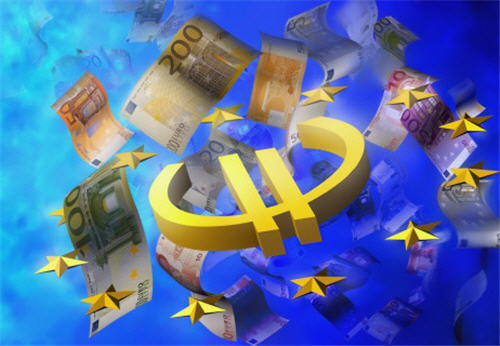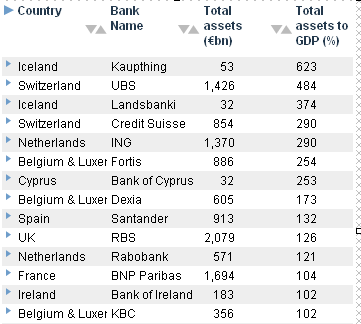
Cynthia O’Murchu and Emma Saunders, writing for the Financial Times, recently asked “Are European banks too big to fail?”
They point to an interactive graphic, that I’ve partly captured at right, which “shows the size of major European banks as a proportion – or multiple – of their home countries’ GDP.”
 As you can see, fourteen have assets which exceed their country’s entire gross domestic product. An additional fourteen, not shown here but on the FT graphic, have assets above fifty percent GDP. There’s a big caveat, which O’Murchu and Saunders note: “the asset values refer to the whole bank, and should not be viewed as contributing toward any particular economy.” Some, or perhaps all, of these banks have assets outside their home country.
As you can see, fourteen have assets which exceed their country’s entire gross domestic product. An additional fourteen, not shown here but on the FT graphic, have assets above fifty percent GDP. There’s a big caveat, which O’Murchu and Saunders note: “the asset values refer to the whole bank, and should not be viewed as contributing toward any particular economy.” Some, or perhaps all, of these banks have assets outside their home country.
Still, the chart illustrates that some of these banks may have gone beyond “too big to fail” into, as the Center for American Progress’ Matt Yglesias puts it, “too big to save.” That is, beyond the capacity of their host government to bail them out and likely to lead them to “cast their eyes toward Brussels.” Then again, as Yglesias notes, the top four banks are in Iceland and Switzerland, who are not EU members.
George Mason economist Tyler Cowen points to this and other factors, including recent reports that European bank woes are largely a function of domestic mismanagement rather than being victim of the U.S. crisis, to argue that the dollar is much stronger than generally realized. He contends that the government’s handling of the crisis has actually been beneficial in one key respect:
[T]he Chinese now regard us as “battle tested.” We have been through some truly major bumps, yet no major U.S. politician has called for “not paying back the Chinese.” We’ve even guaranteed the $350 billion in agency securities held by the Chinese central bank and without a stir. I think the Chinese are shocked by that and in many ways they now trust their investments more than before, not less.
The Chinese do not have comparable trust in “Europe.” If something went wrong in the financial realm, who would they call up on the phone? Which country? What do they think is the power base of the head of the ECB? What political party does that person belong to? What favors can be traded and with whom? Whose answer would count as definitive? Keep in mind that for all of China’s modernity, their leaders are still communist party functionaries.
This weekend’s maneuvering, where the Big 4 agreed to stick together on Saturday and Germany promptly ignored that promise on Sunday, likely doesn’t add to that confidence level.
In any case, I suspect Cowen’s right when he says, “The negative scenario for the dollar is where the Chinese economy collapses, not where the Chinese become too afraid to buy dollar-denominated assets.” Whether any bank is “too big to fail” is debatable. Certainly, though, the American economy is.
James Joyner is managing editor of the Atlantic Council.
Image: europe-money.jpg
